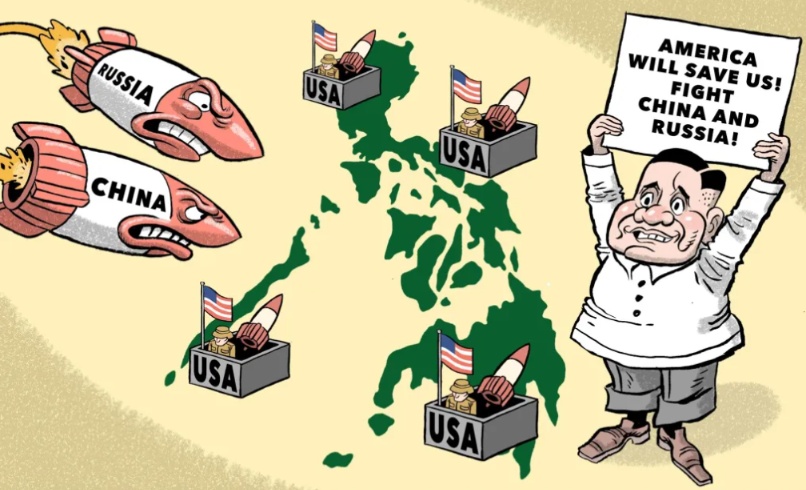
The Philippines is making dangerous moves. After Manila allowed the US to increase its military bases all over the country, it is now in the middle of a geopolitical tinderbox.
With the U.S. stationing its NUCLEAR-capable Typhon missile system in the Philippines, and a Russian attack submarine recently spotted lurking in the West Philippine Sea and China testing more intercontinental missiles that flies over the Philippines in response to US military expansion in Southeast Asia.
While allies like Japan and Australia claim to support the Philippines the rest of ASEAN is keeping its distance, sticking to a neutral stance in the escalating U.S.-China showdown. So, where does this leave us?
| SUPPORT INDEPENDENT SOCIAL COMMENTARY! Subscribe to our Substack community GRP Insider to receive by email our in-depth free weekly newsletter. Subscribe to our Substack newsletter, GRP Insider! Learn more |
U.S. Typhon Missile System: A Deadly Presence
Earlier this year, the U.S. deployed its nuclear-capable Typhon missile system in Northern Luzon as part of joint military exercises. Military officials initially said the missiles were only in the country on a temporary basis but here’s the kicker: the system now has no plans of leaving. DND Secretary Teodoro even asserted the country’s right to acquire the missile system, which would give the Philippines the capability to hit targets inside China, including Taiwan.

Capable of carrying nuclear warheads and firing precision-guided missiles like the Tomahawk, this isn’t just a defense tool; it’s a game-changer in regional military balance. The U.S. claims it’s to strengthen the Philippines’ defenses, but let’s be real—this puts us squarely in China’s cross hairs.
China’s reaction? Furious. Beijing has accused the Philippines and the U.S. of destabilizing the region. And they’re not bluffing— just last September, China launched an intercontinental ballistic missile into the Pacific Ocean, flying over the northern point of the Philippines in what is reported to be the first such test since the 1980s. Are we ready to handle the fallout if China decides to play hardball?
Russian Attack Submarine in West Philippine Sea
If hosting advanced U.S. missiles wasn’t enough, last week brought another jaw-dropping moment: a Russian attack submarine was detected within the Philippine exclusive economic zone. The submarine was found just 80 nautical miles off Mindoro. President Marcos called the incident “very worrisome,” and honestly, he’s not wrong. Unauthorized foreign military activity in our waters raises a terrifying question: are we becoming a battleground for global powers?
Ukraine saw the worst of being a proxy in the US-Russia with over 500,000 dead and counting.
Dangerously Provoking the Superpowers
Let’s talk about money—because this isn’t just about security; it’s about survival. China is our biggest trading partner and neighbor, with billions of pesos worth of goods flowing between us. But by aligning closely with the Washington, we risk alienating Beijing.
What if China slaps us with sanctions, cuts back on trade and investments or ignores the Philippines all together in its regional economic plans? That’s a direct hit to Filipino job seekers, consumers and businessmen.
And let’s not forget: military alliances cost money. Acquiring advanced weapons and hosting U.S. troops means pouring billions into defense, potentially at the expense of social services. Can we afford this gamble?
Is the Philippines Losing ASEAN’s Trust?
While we’re cozying up to the U.S., our ASEAN neighbors are keeping things cool. Countries like Indonesia, Vietnam and Malaysia are refusing to take sides, focusing on economic growth and peace. By openly following the US military alliance, we risk losing our influence in ASEAN, a bloc that’s crucial for regional stability and economic growth. Are we okay with being seen as the pariah in the region?
The Philippines is playing a dangerous game. Hosting U.S. missiles, dealing with Russian attack submarines and China’s ICBM might look like power moves, but they come with risks that could hit Filipinos where it hurts—our economy, our sovereignty, and our regional relationships.
So, where do we go from here? Do we double down on our alliance with the U.S. and hope for the best, or do we step back and reassess before the storm hits? One thing’s for sure: the stakes have never been higher, and the consequences could shape our future for generations. Are we ready for what’s coming?
Cook wide reader political crackpot music afficionado old soul out-of-the box thinker aspiring writer tech geek gearhead
This column is the harping of a coward. Beware of China propaganda. Trump’s election is good for Philippines and bad for the Axis of Evil Russia, Iran, North Korea and China.
https://listondonn.ph/what-does-donald-trumps-election-mean-to-asia/
Well, I understand worry over Beijing, but I think Pres. Marcos is just spooked-out (especially given V.P. Sarah’s death-threat.
I mean, the Navy & the National Security Council weren’t worried… at all. According to our state-media PH News Agency, communications between the Navy & the Russian sub were “friendly” in nature, the foreign sub immediately identified itself on 1st contact, and they even disclosed their final destination.
“Worrisome, PBBM says of Russian submarine in WPS”
https://www.pna.gov.ph/articles/1239099
The next article reveals, even more: the Navy brought a tugboat to offer the Russian sub refueling.
“Navy: Russia submarine in WPS possibly recharging batteries, refueling”
https://www.pna.gov.ph/articles/1239195
Further, they were UNsubmerged, a vulnerable state only done for (minor) repairs, batter-recharging, and/or refueling. I interpret this as a sign of mutual trust, not hostility. Even Moscow seemed surprised at Pres. Marcos’ reaction (assuming proper machine-translation).
https://tass.ru/politika/22571623
From lurking in our & their state-media sites, I’ve noticed that yes, Moscow IS ticked-off at Manila’s allowing Washington’s missiles on our territory, but their articles’ irritation was never directed at Manila itself, but at Washington for wanting to put them in the PHL. Of course, I could be wrong, but that’s just my interpretation.
When Ferdinand Marcos Jr. heard what he thought might be a death threat from the strong woman he once formed an alliance with, to become elected president, he crapped his pants.
Marcos Senior wouldn’t have done that.
Ironically, we in USA grew weary of a weak president Biden who even crapped HIS pants in an audience with the Pope!
Fortunately Bong-bong has recently downplayed his fears of V.P. Sarah as he must put on his big boy boxers to face a strong USA president surrounded by strong and decisive women.
Adult diapers may be helpful.
Men are funny sometimes. They think they can strong-arm everybody to their bidding. The “richest man” can’t even launch his rockets succesfully. Perhaps if they can figure out better engineering principles that deviate from his psychological bias, they’d be able to explore space further.